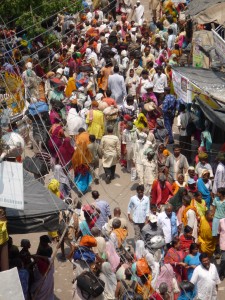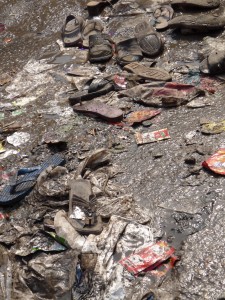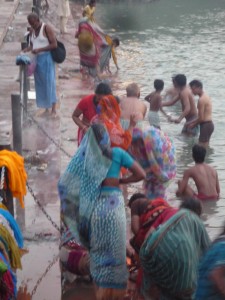Midnight Pilgrimage (Part I)
“Don’t ask any more questions. Just decide that you’re going to go, and go,” our friend Yogi told us. We were trying to get to the same place as 15 million other people. We’d be able to get exactly as far as we truly, truly wanted to go. No further.
It was the night before the last major bathing day of the Kumbh Mela, a Hindu festival that occurs every twelve years–and the largest religious gathering in the world. The story goes that long ago, the nectar of immortality was unearthed from the depths of the ocean. As two factions battled for their chance at eternal life, Vishnu appeared and stole the precious liquid. As he flew away, four tiny drops fell. When the Kumbh Mela occurs, those who bathe in the Ganga where the drops fell (particularly on the most auspicious days of the festival) can have all their sins washed away.
For three days we had been in Rishikesh, just an hour north of Haridwar where the Kumbh was being celebrated that year. The town was swollen with pilgrims, many of whom had come from villages and were unaccustomed to the logic of claustrophobic urban streets. It seemed a crowd with a micro view: expertly wrapped and pleated into the complex folds of synthetic saris and neon turbans, but edgy in the unpatterned crush of their own masses. Loudspeakers had been set up around the city and all day long featured a succession of lost aunties and cousin-brothers calling for their families to come find them.
At sunset we would watch the evening prayer service to the Ganga from our balcony, devotees setting off candles into the water and planting incense in the sand for the river goddess. The streets seemed to demand a different kind of offering–there were abandoned sandals that had been lost in the shuffle everywhere, hundreds of them. (I imagined Rishikesh as the shoe equivalent to that mysterious place where all missing socks go.)
The banks of the river became a campground. After dark the small bundles that had earlier floated over the crowd balanced on women’s heads were unpacked as everyone settled in to sleep wherever they could find space. Each night a new group could be heard singing devotional songs, someone clapping, some voice fading and a second joining in as the performances continued late into the night. In the mornings, women bathed in the river and aired out their saris by standing one at each end as though they were holding political banners. The cloth, taut against the wind, seemed to be the only still space in all of Rishikesh.
Just off the river, the ashram where we were staying was pulsing with its own anticipation. Like us, no one had been quite confident enough to plan to actually make it to the Kumbh for the big bathing day. Still, various groups of foreigners seemed to be in the process of electing their hardiest (or perhaps craziest) delegates to attempt the trip. We weren’t sure if we’d make it out of the neighborhood, let alone out of town. The foot bridge that led to the other side of the river, which led to the road to Haridwar (which was closed), appeared from our window to be running one-way. If this was the state of Rishikesh, a mere truckstop on the way, what of Haridwar? We knew if all else failed we could come back and follow Yogi’s example. “I’m just going to picture Haridwar in my mind while I bathe here in Rishikesh.” I grappled with the numbers, with the inscrutable idea of fifteen million.
If this was Rishikesh, of course we had to try to see the Kumbh itself.









